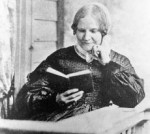
How could one of the most celebrated 19th century authors become a figure so reviled, so controversial that her best-selling books were stomped into the dirt and burned in the streets? To pioneering slavery abolitionist and civil rights advocate Lydia Maria Child, such wrath clearly proved of the need for drastic social reform, strengthening her convictions and inspiring others in the battle for racial equality. This led to the American Civil War and Civil Rights Movement of the 1950s and 1960s.
Child (1802-1880) was a novelist, editor, journalist and scholar who produced a body of work remarkable for its originality and variety, much of it inspired by a strong sense of justice and love of freedom. Little known today, in her own time she was a famously radical abolitionist.
Child’s story is now available in documentary film and book form in Over The River … Life of Lydia Maria Child, Abolitionist for Freedom. Theatrically released in 2008 in Los Angeles and Philadelphia and narrated by Diahann Carroll, Over the River navigates Child’s challenges and triumphs, from the untimely death of her mother and rocky marriage, to her literary success and enduring social impact.
Using archival photos and illustrations, rarely seen documentary footage, scholarly interviews and dramatic reenactments, Over the River rescues Child from obscurity and brings her spirit vividly to life.
Famous today for her poem-turned-song, “Over the River and Through the Woods to Grandmother’s House We Go,” Child risked her career for her belief that “people should be judged as individuals, not as members of groups,” according to author and professor Lori Kenschaft.
Child came to support the inalienable rights for Native Americans, slaves and women. Child’s literary influence changed opinions about slavery, recruiting legislators, ministers and families. She even compelled President Lincoln to believe that slaves should be freed.
